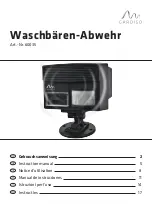
Electrical Installation
6
4 Electrical Installation
Getting Started
Daktronics recommends that a separate circuit be run to the electronic display(s) to
isolate it and prevent any issues that could be caused by line voltage fluctuations or
high frequency noise on the power line caused by other types of equipment. A separate
circuit also makes display maintenance and troubleshooting easier. Daktronics assumes
no liability for any issues caused by line voltage fluctuations or other improper power
conditions if these recommendations are not followed.
Only qualified individuals should terminate power and signal cable within this Daktronics
display.
The Daktronics engineering staff must approve any changes made to the display. Before
altering the display, submit detailed drawings for the proposed modifications to the
Daktronics engineering staff for evaluation and approval, or the warranty will be void.
Conduit
Daktronics does not include conduit. Possible power and signal entrances are
designated on the shop drawing. Separate conduit must be used to route the following:
• Power
• Signal
To prepare for power and signal entrance:
1.
Remove the bottom three modules, using a
1
/
8
" hex head wrench. Refer to
Accessing the Internal Components (p.9)
2.
Clear the area for drilling. Choose area free of wired components.
3.
Make a separate pilot hole in the back or side of the enclosure for power and signal.
Ensure none of the internal components are damaged. Attach the conduit and route
power and signal cables. Use watertight connections where the conduit enters the
display cabinet.
Grounding
All components of a display system—including but not limited to displays, control
equipment, and connected peripheral equipment—must be electrically grounded.
Only qualified individuals may perform electrical work, including verification of ground
resistance. Daktronics is not responsible for improper grounding or damage incurred as a
result of improper grounding.
Grounding methods must meet the provisions of all applicable local and national codes.
Inspect and verify all grounding methods meet the provisions of all applicable local and
national codes.
Proper grounding is necessary for reliable equipment operation and general electrical
safety. Failure to properly ground the display system may void the warranty, disrupt
operation, damage equipment, and cause bodily harm or death.
Note:
Before drilling, be aware of the location of internal components.







































